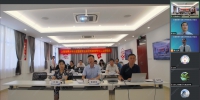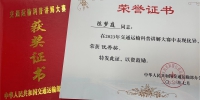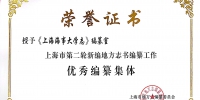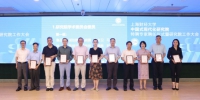《观察者网》:张维为教授受访纽约时报
中国为什么会成功?这是复旦大学政治学教授、中国发展模式研究中心主任张维为多年来努力试图阐明的一个问题,既是向中国人自己,更是向国际社会。
昨天(6月12日),《纽约时报》刊登对张维为教授的采访,张教授指出:西方不少媒体和批评人士对中国社会实际状况的歪曲,让他想起了1793年英国使者马嘎尔尼访问中国的情景。在那时,清朝的乾隆皇帝在异国使节面前摆出一副傲慢的姿态,展现着中国版的“历史终结”论。如今,西方民主“历史终结”论甚嚣尘上,事情难道正在发生反转?这一命运似乎降临到了西方头上:西方正在变成傲慢的“乾隆”?
张维为教授认为,对这种傲慢,最好的回应方式就是讲好中国故事,形成新的“中国话语”,造就新的“中国叙事”。
【图】复旦大学政治学教授、中国发展模式研究中心主任张维为
以下为《纽约时报》报道全文:
不少中国学者和官员都曾提起,中国国家主席习近平阅读过张维为教授的专著——《中国震撼:一个文明型国家的崛起》,并把它推荐给前世行总裁罗伯特•佐利克这样的人物。当记者向张维为问及此事时,他答道:“我很高兴,习近平推荐了这本书。”
现年57岁的张维为,十几岁的时候曾做过雕刻厂工人。20多岁的时候,他开始做邓小平的英语翻译。作为复旦大学政治学教授和中国发展模式研究中心主任,张维为是政治和经济发展“中国模式”领域内的领军人物。按照张维为的理论,在中国共产党领导下的中国正走在正确的道路上并最终会获得成功。他2014年撰写的新书——《中国超越:一个文明型国家的光荣与梦想》,将上述观点进一步深化,其英文版将在今年推出。
张维为表示,西方批评人士应当超越长期唱衰中国的逻辑,在这一点上,他们已经错了几十年。中国不会崩溃;民调显示,大部分中国人都觉得比以往要幸福;中国的经济规模注定会超越美国。在采访中,张维为解释了,中国必须形成自己的话语权,即一种“叙事”或一种“话语”,中国要讲好中国自己的故事,并以此克服来自外部的偏见。
【图】《纽约时报》网站刊发了对张维为教授的采访
以下为部分采访实录:
纽约时报:您曾经是邓小平先生的译员。“中国的话语权”一词,您认为怎样才能恰当地译为英文?
张维为:我建议译为“中国话语”(Chinese discoures)或者“中国叙事” (Chinese narratives),或者在某些情况下,也可以译为“中国的政治叙事”(Chinese political narratives)。这也意味着,中国话语在世界上应有一席之地。
纽约时报:为什么“中国话语”如此重要?
张维为:话语对于任何国家而言,都很重要,特别是对于中国这样一个超大型、快速变化的大国。中国崛起具有全球意义,也引发了不少问题和疑虑。在我看来,中国必须直面这些问题和疑虑,对自己的人民,对整个世界清晰而自信地解释和表述自己。这就不仅在内容上,也在形式上,对新的话语提出了要求。
中国拥有自己独特的官方话语,包括党的理论和外交政策的声明等。不过,这些话语对外国人,甚至是一部分中国人来说,还不是很好懂。理解这些话语,需要拥有对中国政治背景的知识。例如,对中国自身发展来说,对统一党内思想来说,“科学发展观”是一个至关重要的概念。不过这个概念外国人不容易理解。
自习近平执政以来,他号召共产党要改变文风和会风。他自己以身作则,与群众交流时采取了更为直接和活泼的方式。
纽约时报:拿什么来建立这种话语呢?
张维为:就中国而言,为建立这种新话语的社会、经济和政治条件业已成熟。对这种话语,已经产生了明确且不断增长的需求。中国崛起已经到了今天这个地步,中国已经不能回避来自外部和内部的任何疑问。中国人和外国人都同样希望更好地理解,中国已经做了什么,正在做什么,未来将会做什么。用经济学的行话来说,只要有需求,就会有供给,这是自然而然的事情。
纽约时报:您的中国发展模式研究中心的工作有哪些?
张维为:我们特别关注中国发展模式和经济模式。
在2011年与弗朗西斯•福山(斯坦福大学政治学教授、《历史的终结与最后的人》作者)的一场辩论中,我告诉他,我们确实在质疑很多西方人当做不言自明的假设,例如什么是真正的民主,什么是真正的良政。我们也同样质疑新自由主义经济学,质疑其对中国经济和世界经济秩序的看法。
我举个例子,好让你更好地了解我是怎么看中国模式的。
在政治领域,中国建立了一套或许可以被称作“选拔+选举”的“选贤任能”模式。这种模式可以与西方纯粹依赖选举的模式进行竞争。
经济上,“社会主义市场经济”本质上是一种混合型经济:看得见的手与看不见的手混合,政府调控与市场力量的混合。自1994年中国提出“社会主义市场经济”观念以来,中国是主要经济体中唯一没有经历金融危机、债务危机和经济危机的国家。尽管中国模式并非十全十美,但仅仅是上述成功,就足够证明中国模式的信誉。
在社会领域中,中国模式是社会与国家之间高度的良性互动,这与西方的社会对抗国家模式不同。如今的中国社会极为活跃,但同时总体秩序良好。
纽约时报:您最近说过,“我们可以学一点普京”(俄罗斯总统)。您这句话的意思是?
张维为:无论是讨厌还是喜爱,普京和他的团队与西方在很多议题上展开辩论。中国也必须在多种议题上与西方批评者展开辩论。
在这样的背景下,中国就必须建构全面、透彻、有力和国际的话语。
“全面”,就意味着,中国话语必须能够解释中国的成就、问题及未来。
“透彻”意味着它可以清晰和透彻地阐释中国事务。
“有力”指的是可以与别人进行有意义的对话和辩论。
“国际”,即一种让外国人能够理解的中国话语。
纽约时报:您曾经说过,中国近现代史可以被分为三个部分:解决“挨打”(1949年建国)、“挨饿”(改革开放)和今天的“挨骂”(来自外国人的)三个问题。您在哪里看到了这类“挨骂”?
张维为:看看西方媒体,如BBC或者CNN对中国的新闻报道。比起中国媒体对西方的报道,他们的意识形态色彩至少要强10倍。
他们的意识形态偏见是如此之强,以至于让我想起了文革期间中国媒体对西方的报道。只要一提及西方,总是要加上个“资本主义”。如今,只要西方媒体提起中国,他们总要加上意识形态上词汇,如“共产党”、“极权”或者“独裁”。他们展示天安门广场的图片,总要在其中放上警察,以表现中国是个压迫式的警察国家。
这类西方宣传不能准确地介绍一个真实的中国,也导致了对中国的一再误判。我认为西方应该克服了自己意识形态上的紧箍咒,摆脱自己的意识形态偏见,重新正视这个快速发展的国家。不过,另一方面,我们对此也无能为力,其实,我们也不在乎,因为我们对这种不良而荒谬的报道,对这些可悲的错误预测已经习以为常。让他们继续在黑暗中徘徊吧。
我在西方生活过20多年(张维为曾获日内瓦大学国际关系学博士学位并在牛津大学做访问学者),我真的认为,有必要唤醒一下西方:学会客观地看待中国并了解大部分中国人是如何看待自己国家的。在我与福山2011年的辩论中,我对他提及,西方对待中国的方式,就让我想起马戛尔尼(在试图打开中国市场方面,他在这次访问中一败涂地)1793年访问中国的场景。当时的清朝皇帝乾隆,向马戛尔尼展示了中国版的“历史终结”论,或者说“我们最棒,你一无是处”。当然,在展现了如此的文化傲慢后,历史已经见证中国后来的急剧衰落。如今,这一命运似乎降临到了西方头上。
纽约时报:邓小平曾经有一个著名的说法“韬光养晦”。如果说中国正准备找回自己的声音、自己的叙事,是不是意味着那些日子已经过去?
张维为:邓小平确实说过,中国应当“韬光养晦”,并专注于自己的现代化进程。不过,邓小平表述这个观点的背后,是一种自信:即中国走在历史正确的道路上。而他观点的这一重要部分在此后对其阐释中,不知道为什么被忽视了。韬光养晦是基于自信的韬光养晦。在此立场下,中国核心利益必须得到尊重。这同样也是邓小平的想法。
随着中国的崛起,习近平在一些关键性事务中,正从战略模糊走向战略清晰。这是基于自信,同样也反映了一种中国内部达成的新共识。在这一共识下,随着中国崛起,中国必须更为积极地参与战略和外交事务。事实上,许多国家,包括西方主要国家在内,都曾表达过这一愿望:他们希望中国能够承担更多国际责任并提供更多国际公共产品。
纽约时报:美国误解中国了吗?那么欧洲呢?
张维为:美国和欧洲都经常误解中国,特别是他们主流媒体对中国的报道和预测。区别在于,大部分欧洲国家似乎更能接受中国崛起并且更多地视之为一种双赢的机会。不过,美国仍然很大程度上处在零和游戏的状态中,并对中国充满疑虑甚至是敌意。我对美国的忠告也是:美国应该以双赢的视角来看待中国崛起。
(观察者网李晽编译自《纽约时报》)
附英文全文:
NEW YORK TIMES.
Q. and A.: Zhang Weiwei on Why China Will Succeed Under the Communist Party
By DIDI KIRSTEN TATLOW JUNE 12, 2015 9:03 AM June 12, 2015 9:03 am
When Zhang Weiwei was asked if it was true, as had been whispered among Chinese academics and officials, that President Xi Jinping had read his book “The China Wave: Rise of a Civilizational State” and recommended it to people such as the former World Bank president Robert Zoellick, he answered, “I’m glad he did.”
Zhang Weiwei directs the Center for China Development Model Research at Fudan University.
Mr. Zhang, 57, who as a teenager spent three years in a Shanghai factory carving jade and in his 20s served as an English interpreter for Deng Xiaoping, is now a professor of politics at Fudan University in Shanghai, where he directs the Center for China Development Model Research, and a leading theorist of the “China model” of political and economic development. This holds that China under the Communist Party is on the right path and is destined to succeed. His most recent book, “The China Horizon: Glory and Dream of a Civilizational State,” which is due out in English this year, continues that theme.
Western critics need to get over their gloomy predictions about China, Mr. Zhang says, which have been wrong for decades. China is not going to collapse; polls show that most people are happier than ever; and the country’s economy is certain one day to overtake that of the United States. In an interview, Mr. Zhang explained why China must craft its own huayu quan (话语权, literally “speech language power”), a “narrative” or “discourse,” to tell its own story and overcome the ideological prejudices of its foreign critics. Excerpts follow:
Q.
You were an interpreter for Mr. Deng. How would you like to see “China’s 话语权” translated into English?
A.
I suggest “Chinese discourse” or “Chinese narrative,” or in certain contexts, “Chinese political narrative.” It means there is a rightful place for Chinese discourse in the world.
Q.
Why is this important?
A.
Discourse is crucial for any country, especially for a superlarge and fast-changing country like China, whose rise has global implications and provokes questions and suspicions. To my mind, the country should face them squarely and explain itself clearly and confidently to its own people and to the outside world. This calls for new narratives, new in content as well as in style.
“The China Horizon” will be published in English this year.
China has its own official political discourse ranging from the party’s doctrines to China’s foreign policy statements. But it’s also true that such a discourse is not easily understandable to non-Chinese, or even to many Chinese. It requires knowledge of China’s political context. For instance, the “scientific outlook for development” is a concept crucial for China’s own development and for unifying the ideology of the party’s rank and file, but it is hardly understandable to non-Chinese.
Since Xi Jinping came to power he has called for changing the writing and speaking style of the party and he himself took the lead in communicating with the people in a more direct and dynamic way.
Q.
What is needed to create such a discourse?
A.
As far as China is concerned, social, economic and political conditions are ripe for constructing such a new narrative. There is a clear and growing demand for such a discourse. China has risen to such a degree that it can’t evade any questioning from within or without. Both Chinese and foreigners want to make better sense of what China has done and is doing and will do in the future. In economics jargon, when there is a demand, there will be a supply, which is coming naturally.
Q.
What are you researching at the Center for China Development Model Research?
A.
We focus on both political and economic dimensions of the “China model.”
As I told Francis Fukuyama [the Stanford political scientist and author of “The End of History and the Last Man”] during ourdebate in 2011, we are indeed questioning many assumptions that are often taken for granted in the West, such as what constitutes democracy and good governance. We are also questioning neo-liberal economics and its perception of the Chinese economy and the world economic order.
Let me give you an example of how I perceive the China model.
In the political domain, China has created a model that can perhaps be summarized as “selection+election.” Selection is largely based on meritocracy and this model can compete with the Western model of relying solely on popular elections.
Economically, its “socialist market economy” is essentially a mixed economy: mixing the visible hand with the invisible hand, the state planning with the market forces. Since China put forward the concept of the socialist market economy in 1994, China is the only major economy that has not experienced the kind of financial crisis, debt crisis and economic crisis that have distressed so many countries. This success alone gives significant credit to the China model, however imperfect it is.
Socially, the China model is about highly positive interactions between society and the state, differing significantly from the Western model of society contesting the state. Chinese society today is extremely dynamic, but also in reasonably good order.
Q.
You said recently that “We can learn from Putin,” [the Russian president]. What did you mean?
A.
Like it or not, Putin and his team engage the West in debate on many issues. China should also engage its Western critics in debate on various issues.
In this context, China’s new type of narrative should be comprehensive, thorough, robust and international.
Comprehensive, so as to be able to explain China’s achievements, setbacks and future.
Thorough, to be able to explain Chinese affairs clearly and thoroughly.
Robust, to be vigorous enough to engage critics in meaningful dialogues and debates.
International, to be readily understandable to most non-Chinese.
Q.
You have said that China’s recent history can be divided into three parts: overcoming bullying [before the 1949 Communist revolution], overcoming starvation [under the leadership of Mao Zedong, post-1949] and now overcoming “bad-mouthing” [by foreigners]. Where do you see this “bad-mouthing”?
A.
Look at the Western media, BBC or CNN’s coverage of China. They seem to be 10 times more ideological than the Chinese media’s coverage of the West.
Their ideological bias is so strong that it reminds me of the Chinese media’s coverage of the West during the Cultural Revolution. Whenever the West was mentioned then, the word “capitalist” was added. Today, when the Western media mention China, they always attach such ideologically charged words as “communist,” “authoritarian,” “dictatorship.” And whenever they present a picture of Tiananmen, they put a policeman into the picture suggesting China is an oppressive police state.
This kind of Western propaganda cannot convey accurately what China really is to the outside world and leads inevitably to wrongly crystal balling China all the time. I wonder when the Western media can overcome their own ideological straightjackets and look at this fast-changing society afresh and free from ideological bias. But on the other hand, we cannot do much about it, and we don’t care much about this either, as we are used to this kind of nasty and ridiculous coverage and miserably wrong forecasts about China. Let’s leave them in darkness.
Having lived in the West for over 20 years [Mr. Zhang holds a Ph.D. in international relations from the University of Geneva and was a visiting fellow at Oxford], I really think there should be a wake-up call in the West. Look at China objectively and understand how most Chinese perceive their own country. As I told Fukuyama in the 2011 debate, the Western approach to China reminds of me of Lord Macartney’s visit to China in 1793 when he had an audience with Emperor Qianlong [in an unsuccessful mission to open China to foreign trade]. The emperor in fact displayed the Chinese version of “the end of history thesis” at that time, or, “We’re the best, and you’re nothing.” Of course, history witnessed China’s sharp decline after this show of cultural arrogance. Today this fate may befall the West.
Q.
Deng Xiaoping, whom you knew, had a famous saying to the effect that China should “bide its time and hide its hand.” If China is to find its voice, its narrative, are those days over?
A.
Deng did say that China should keep a low profile and focus on its own modernization drive. But Deng expressed this view from [a starting point of ] confidence because China was on the right historical path, and this important part of his idea was somehow missing from many later interpretations of his remark. Keeping a low profile should be from a position of confidence, and under the condition that China’s core interests are respected. That was also Deng’s idea.
With the rise of China, Xi Jinping has gone from strategic ambiguity to strategic clarity on a number of key issues [such as the South China Sea, where China has engaged in land reclamation projects to advance territorial claims disputed by other countries]. This is based on self-confidence, and also reflects the new consensus reached within China that, with the rise of China, the country should be more proactive in its strategic and foreign policy. In fact, many countries, including major Western ones, have expressed the hope that China take up more international responsibilities and provide more international public goods.
Q.
Is the United States getting China wrong? What about Europe?
A.
Both the United States and Europe often get China wrong, especially their mainstream media coverage and forecasting about China. The difference is that most European states seem to accept China’s rise and increasingly see it as a win-win opportunity. But the United States is still largely in a mode of zero-sum games and treats China with a lot of suspicion and even hostility. My counsel to the United States is also to treat China’s rise from a win-win perspective.





